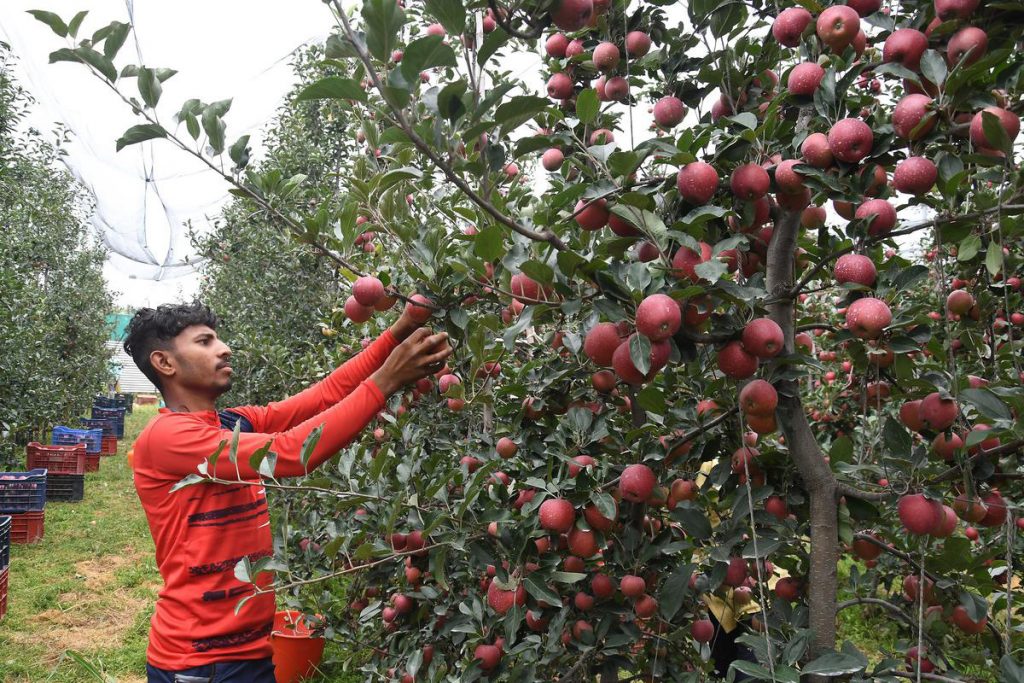
The increase in imports from neighbouring countries of Iran and Afghanistan has led to a massive 40 percent reduction in demand for Kashmiri apples. Though authorities are trying to gauge the impact and quantity of these imports, not much is expected to change. A report by Riyaz Wani
The influx of Iranian and Afghan apples into India’s largest fruit market, Azadpur, has sparked concerns among Kashmir’s fruit growers and dealers. In a period of 35 days across October and November, a total of 7,267 metric tonnes of apples arrived from Iran and Afghanistan, contrasting sharply with the shipment of 89,000 MTs of Kashmiri apples during the same period.
The increase in imports from these neighboring countries has led to a massive 40 percent reduction in demand for Kashmiri apples,according to fruit growers in Kashmir. Though authorities have taken notice, initiating assessments to gauge the impact and quantity of these imports, not much is expected to change.
However, concerns persist among growers and dealers who have expressed worry over the flow of Iranian apples via the Wagah border. In a recent letter, they’ve sought intervention of the Prime Minister Narendra Modi, urging him to consider measures such as imposing a ban or 100 percent excise duty on Iranian apples to alleviate the challenges faced by fruit growers not only in Kashmir but also in Himachal and Uttarakhand.
The central government’s decision to waive off a 20 percent tariff on apples imported from the United States has made things even more difficult for the farmers.
These challenges compound existing issues within the Kashmiri apple industry. Apart from market competition, growers grapple with price crashes, unpredictable weather, insufficient cold storage facilities, and the escalating costs of pesticides and transportation. The cost-intensive process of protecting crops from ailments like scab and mites has significantly reduced returns, adding financial strain on growers.
While the industry faces multifaceted challenges, there’s a glimmer of hope in export prospects. Initiatives like exporting Kashmiri apples to Dubai by groups like the Lulu Group and plans for setting up fruit processing centers signal a potential avenue for market expansion and growth.
Growers remain optimistic about future improvements but emphasize the critical role of government support in addressing transportation hurdles and ensuring fair pricing. With the livelihoods of numerous families linked to the apple trade, local media and industry representatives have called upon the government to play a more active role in safeguarding and fostering the sector’s growth without politicizing its challenges.
Horticulture which is spread across 1.87 lakh acres of land employs more than three million people in Kashmir, earning over Rs 10000 crore for the region
Reduction in production
The price of Kashmir apples surged by 50% this year compared to 2022, hitting a decadal high due to a significant drop in production and a supply shortage exceeding demand. The drop in local apple production itself has created a demand for imported apples from Iran and other places.
According to an estimate, there has been a 20-30% reduction in apple production in both Jammu and Kashmir and Himachal Pradesh. Himachal Pradesh faced crop damage due to a disrupted monsoon, causing a drastic decline in apple output from the usual 800,000 tonnes to merely 300,000 tonnes this year. The estimated losses in the Himachal apple industry due to floods triggered by irregular rains stand at Rs 240 crore.
Similarly, J&K experienced adverse weather conditions that affected apple crops at different growth stages. Basharat Rasool, an apple farmer from Sopore, highlighted the irregular weather’s impact, resulting in an unexpected surge in apple prices due to supply deficits.
“We have had a significant percentage of C grade apples this year,” Rasool said.
C-grade apples are those infected with some disease, or do not grow to have an optimum size and colour. B-grade is slightly better than this while A-grade is the finest quality apple.
Kashmir, which contributes around 75% of India’s total apple production and exports approximately 1.8 million tonnes annually, has witnessed a notable price escalation.
In Sopore, Asia’s second-largest fruit market, Grade-A apple prices have doubled compared to the previous year.
The unprecedented spike in apple prices, fueled by diminished production and increased demand, paints a challenging picture for consumers and industry stakeholders grappling with the supply crunch in the region.
“Unlike last year, when we had a bumper crop, apple production this year declined, largely due to unfavourable weather,” Rasool said. “However, while higher prices compensated for the reduced production, the increasing imports of apples are playing spoilsport. This is where we need the intervention of the government.”













